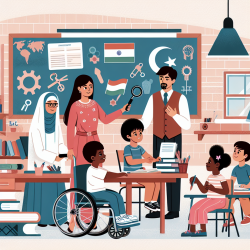As speech-language pathologists (SLPs), we are always on the lookout for evidence-based practices that can enhance the outcomes for children with developmental language disorders (DLD). A recent study published in the Canadian Journal of Speech-Language Pathology & Audiology sheds light on the efficacy of communication partner training (CPT) for children with DLD. This blog aims to explore the key findings of this research and how SLPs can leverage these insights to improve their practice.
Understanding Developmental Language Disorder
Developmental Language Disorder (DLD) is a condition where children have difficulties acquiring language despite normal cognitive abilities and the absence of other neurological, sensory, or emotional issues. These children often struggle with vocabulary development, sentence structure, and conversational skills, making effective communication a significant challenge.
The Role of Communication Partner Training
Communication Partner Training (CPT) involves educating parents, teachers, and other caregivers on how to interact effectively with children who have DLD. The goal is to create a supportive communication environment that facilitates language learning and social interaction. The recent study highlights the importance of CPT in achieving these goals.
Key Findings from the Study
- Improved Communication Skills: The study found that children with DLD showed significant improvements in their communication skills when their communication partners were trained effectively.
- Enhanced Vocabulary: CPT was particularly effective in helping children with DLD expand their vocabulary, which is often a major area of difficulty for these children.
- Better Social Interaction: Training communication partners led to more meaningful and engaging interactions, which in turn helped children with DLD improve their social communication skills.
Implementing CPT in Your Practice
Based on the findings of the study, here are some practical steps that SLPs can take to implement CPT effectively:
- Conduct Workshops: Organize workshops for parents, teachers, and caregivers to educate them about DLD and effective communication strategies.
- Provide Resources: Offer handouts, videos, and other resources that communication partners can refer to for ongoing support.
- Role-Playing Exercises: Include role-playing exercises in your training sessions to help communication partners practice and internalize effective communication strategies.
- Follow-Up Sessions: Schedule regular follow-up sessions to monitor progress and provide additional support as needed.
Conclusion
The study underscores the importance of communication partner training in improving the outcomes for children with developmental language disorders. By equipping parents, teachers, and caregivers with the right skills, we can create a more supportive environment that fosters language development and social interaction for these children.
To read the original research paper, please follow this link: CANADIAN JOURNAL OF SPEECH-LANGUAGE PATHOLOGY & AUDIOLOGY.










